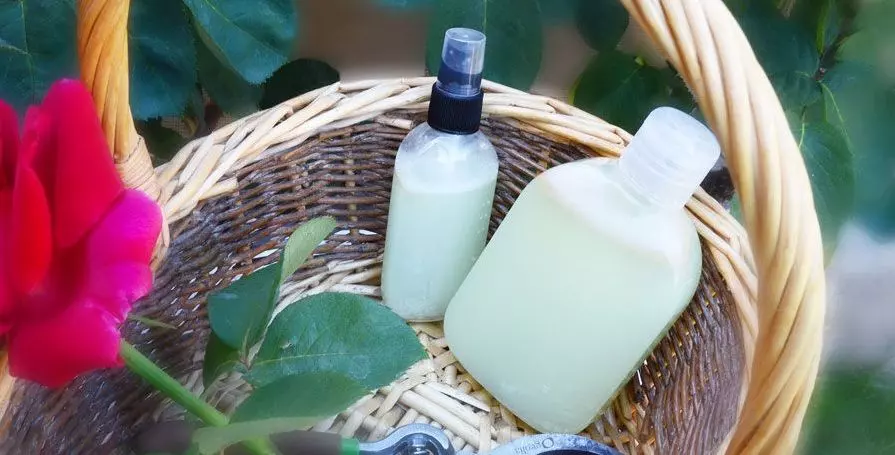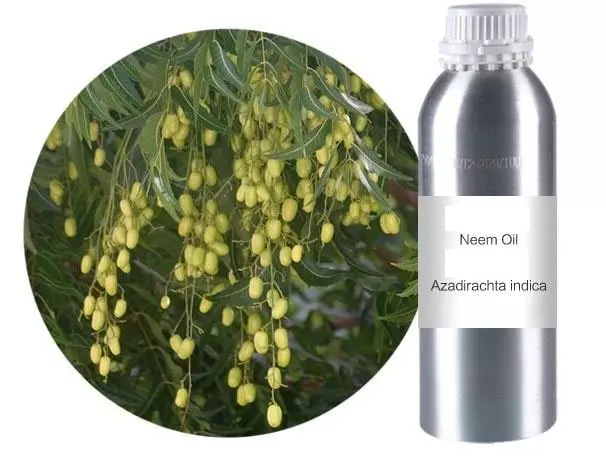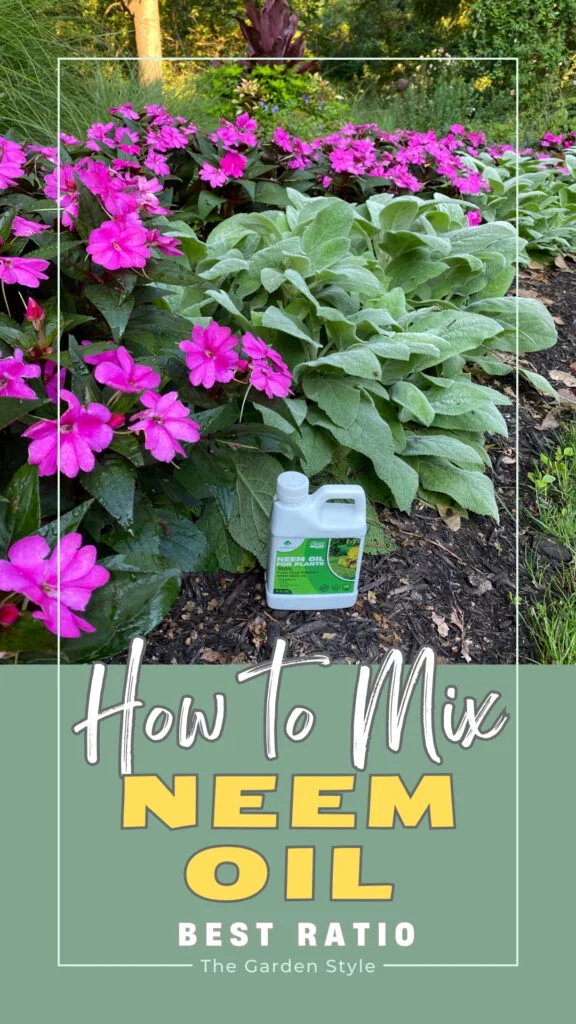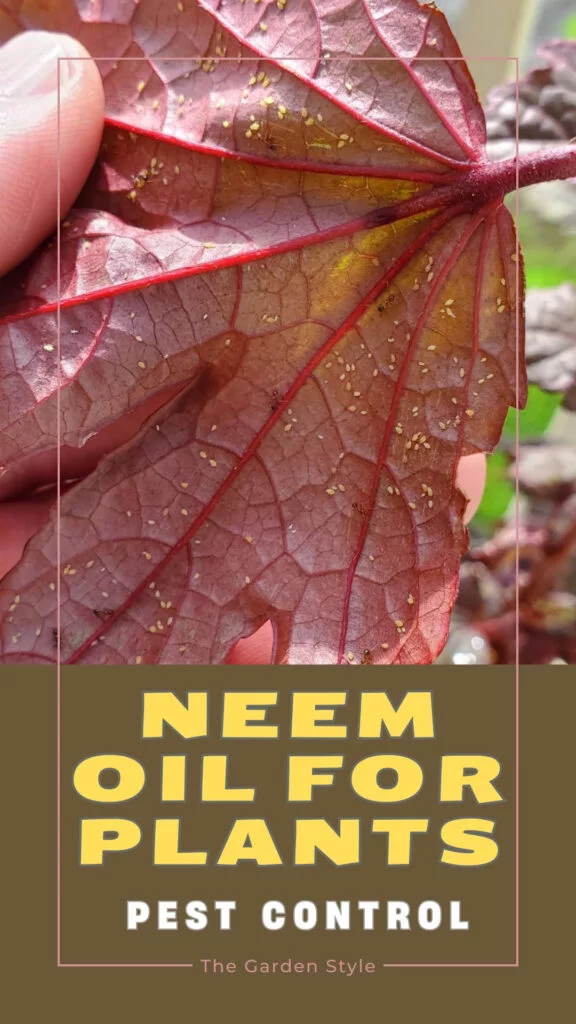Neem oil for plants is a natural ally when it comes to fighting a large number of pests, so you can not miss taking care of your garden and creating an environmentally friendly way to control plant pests. It is also economical and very easy to use! Learn all about How to Mix Neem Oil for Plants in this article. Also, I give you tips on how to dilute neem oil for plants and the recommended ratio for mixing neem oil for plants. That’s why I recommend you to read this article to the end and take advantage of the video to learn how to apply it.
Neem oil is a natural insecticide widely used in organic farming, as it helps fight pests such as aphids and spider mites. It acts as a repellent, preventing insects from damaging plants. Also, if your plants are already affected, neem oil will help you to kill the bugs.
Neem oil is obtained from the seeds of Azadirachta indica also known as neem, Indian lilac, or neem, an ancient tree native to India.
Why does neem oil act as a natural insecticide for plants? Among its main components is Azadirachtin, which helps repel insects and also prevents them from multiplying, hence its effectiveness against multiple pests.
Table of Contents
Neem Oil Insecticide
The use of neem oil for plants as an insecticide is very widespread because it offers many advantages. The fact that it is natural and fights numerous pests must be added to its hydrophobic properties, which are quite useful when used as an insecticide in outdoor crops. Neem oil is not easily washed off the leaves, much less by rainfall, which is why it is so effective.
Neem oil for plants can be generalized to all types of crops and is also authorized in organic farming. It can be used for vegetables, fruit trees, vines, olive groves, legumes, and ornamental plants. After this brief introduction about neem oil for plants, we can now explain how to mix neem oil for plants correctly.
What Is the Use of Neem Oil and Potassium Soap for Plants?
Neem oil, with a dark color, bitter taste, and intense aroma, is extracted from the seeds of the neem tree (Azadirachta indica). Originally from India, neem oil has multiple uses, including insecticide, acaricide, fungicide, and insect repellent.
In addition to its wide field of action in terms of uses, it is also effective against:
- Whitefly
- Mealybug
- Aphids
- Red spider mite
- Thrips
- Leafminers
As for fungi, neem oil is beneficial against mildew or powdery mildew, two of the most common and problematic in most crops and garden plants. It has also been proven effective against nematodes, so we can say that neem oil is universally used to combat almost any type of pest. The fact is that the composition of neem oil for plants is so complex that it is practically impossible for insects to adapt or create a specific resistance.
As for potassium soap, we are talking about another powerful ecological insecticide that, mixed with neem oil, is able to accelerate and strengthen all its properties. In addition, potassium soap has a powerful cleaning effect with which to eliminate the honeydew residues generated by insects. These residues that accumulate on the leaves can cause the appearance of fungi that are so problematic for your plants, as is the case of black mold.
How To Mix Neem Oil For Plants
In addition to quality neem oil, we need these other products to mix neem oil for plants.
- Neem oil
- Liquid soap
- Water
- Spray bottle
The recommended ratio for mixing neem oil for plants is usually between 0.6 and 1 teaspoon of neem oil per 32 fl oz of water. We recommend that you use the same amount of neem oil as soap so that all the ingredients are perfectly integrated. We recommend these two brands of neem oil because they are the ones we use in our garden and have had success in fighting pests.
- Broad Spectrum Fungicide Insecticide Miticide
- For indoor or outdoor use
- Treat Flowering Plants, Trees, Shrubs, Foliage, Vegitables, Fruits, Nuts, and all Landscapes
- Add Neem Organics Gold Leaf Liquid Plant Food Concentrate to water
- PURE NEEM OIL - Our concentrated spray contains pure neem oil cold-pressed from the fruits and seeds of the neem tree (Azadirachta indica)
- NEEM OIL SPRAY FOR PLANTS- Regular foliar application of our Neem oil will ensure your plants remain healthy from seed to harvest
You should use any liquid soap you have at home, whether for hands or dishes, to mix neem oil for plants. Of course, our advice is that it should be homemade if possible since this way, you can be sure that it is made with natural ingredients. You should also scratch a little handmade bar soap that you have at home.
Why do we add soap? It will help the neem oil integrate with the water; it is the only way to achieve this, and that is why it cannot be missing in this homemade trick.
The video below guides you in experimenting with the best ratio for mixing and applying neem oil to your plants.
How To Apply Neem Oil To Plants
- Mix the neem oil for plants with the liquid soap in the quantities indicated in the recipe. Respect the percentages because adding more neem oil will not make the result more effective. You should mix the neem oil in a sprayer like the one we use (Order it here).
- Stir well for a few minutes to emulsify the mixture and ensure that both ingredients are perfectly integrated.
- Measure the water in a large jug and add the previous mixture. Stir again until all the ingredients are unified.
- Pack in a spray bottle to make it easier to apply to plants.
When using neem oil for plants, it is important to remember this advice: it should be applied early in the morning or late in the day, avoiding the central hours of the sun at all times so that the plants do not get burned.
How many days should neem oil be applied? If it is a preventive treatment, it is recommended to use neem oil for plants every 15 to 20 days. If we are looking to combat a plague, it is necessary to spray the plants with this mixture every 4 or 5 days until the insects are eliminated.

Frequently Asked Questions on How to Mix Neem Oil for Plants
Some users write us some specific questions about how to mix neem oil for plants, and here we are going to answer them so that everyone can learn even more about neem oil for plants.
In the following paragraphs, learn how to dilute neem oil for plants and the recommended ratio for mixing neem oil for plants.
How Much Neem Oil per 16 oz of Water
How Much Neem oil per 16 oz of Water? For 16 oz of water, we will need to mix approximately 0.5 oz of neem oil for plants. It is best to always check the manufacturer’s label to be sure of the purity of the product.
How Much Neem Oil per 32 oz
How Much Neem oil per 32 oz? For 32 oz of water, we will need to mix approximately 1 oz of neem oil for plants. As we said before, it is important to read the manufacturer’s label to know the level of purity of the neem oil for plants.
We hope you find this article on how to mix neem oil for plants useful. You should also see our other article on how to apply neem oil to plants for more information.

Pin it for later!





